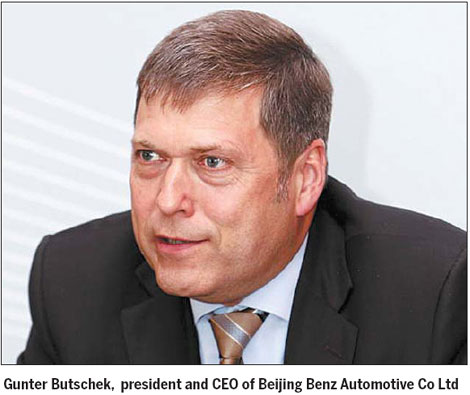New E-Class sedan and parts suppliers of Benz
Daimler AG's joint venture with Beijing Automotive Industry Holding Corp (BAIC) will accelerate its sourcing of locally made parts for production of Mercedes-Benz passenger cars.
 Gunter Butschek, president and CEO of the joint venture - which has been renamed as Beijing Benz Automotive Co Ltd as a result of the breakup of Daimler and Chrysler in 2007- said last week that 45-50 percent of parts for Mercedes-Benz cars it is making are purchased in China at present.
Gunter Butschek, president and CEO of the joint venture - which has been renamed as Beijing Benz Automotive Co Ltd as a result of the breakup of Daimler and Chrysler in 2007- said last week that 45-50 percent of parts for Mercedes-Benz cars it is making are purchased in China at present.
"We are still in the process of further localization," Butschek said.
By last September, the joint venture found 85 suppliers in China for the all-new long-wheelbase E-Class sedan that will begin local production next month, he said.
"We are committed huge investment for suppliers to meet quality standard requirements," he said. "It is an important factor for our future success in the highly competitive market in China."
Asked about whether the joint venture will build an engine plant, he replied that "it is one of the future discussion points - but the volume will be an important factor".
The joint venture established in 2005 to make Mercedes C-Class cars, almost doubled sales to 16,000 units last year.
"We have two right products in the E-Class and C-Class to quickly catch up with our competitors. We do see both of the two products have very good future volume opportunities," Butschek said.
Audi and BMW have much larger sales in China than Mercedes-Benz mainly due to their earlier onset of local production.
Mark Si, executive vice-president for sales and marketing at the Beijing Benz, said it plans to sell a total of 40,000 cars, including 9,000 units of the all-new long-wheelbase E-Class.
The locally made new E-Class has a wheelbase 14 cm longer than its imported cousin and will be put on sale in June, Si said. All of the extra space will be provided to the back-seat riders.
The model will have two versions - 3.0-liter and 2.5-liter - this year, he said. It will have a 2.0-liter version in the future.
"The long-wheelbase E-Class will mainly serve all kinds of elites, such as those in government, business and cultural areas," he said.
The joint venture plans to hike annual production capacity to 80,000 cars with two work shifts a day by 2012 from 25,000 units at present.
It could be increased to 100,000 units a year by adding shifts.
 0
0 






